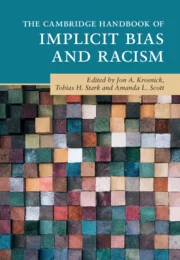Utilizing a new approach, Michael Sargent coauthors a paper examining symbolic racism
Symbolic racism, a form of racism whereby unconscious bias and subtle beliefs serve to justify discrimination against a racialized group, is frequently illustrated through support of laws and policies that undermine or oppose equality. Individuals who purport that they are not racist nonetheless hold negative racial beliefs which impact aspects of their behavior such as voting and political attitudes. In, “The relations among explicit prejudice measures: Anti‑black affect and perceptions of value violation as predictors of symbolic racism and attitudes toward racial policies,” published in the new “Cambridge Handbook of Implicit Bias and Racism,” Professor of Psychology Michael Sargent and colleagues have taken a previously untested approach to question the origins of racial prejudice. Instead of the previously hypothesized origin, they found that the data are consistent with a “mediational chain.” In particular, holding the belief that Black people violate traditional values mediates the effect of “anti-Black affect,” on individual attitudes of policies with racial objectives. In other words, anti-Black affect (negative feelings toward Black people) leads to the belief that Black people don’t conform to traditional values (such as hard work), and those beliefs in turn lead to opposition to race-targeted policies. Sargent and his coauthors view these data as consistent with a “rationalization hypothesis”: when White people endorse the belief that Black people violate traditional values, those beliefs may simply be rationalizations for negative feelings toward Black people, rationalizations that then affect policy attitudes. Such research helps inform our collective understanding of the underpinnings of public opinion on racial policy.
Professor Sargent is a social psychologist by training, but with interests in political psychology. Most of his research focus is on the ways that people’s collective identities relate to how they think about politics, especially their opinions toward policies. He’s especially interested in racial and ethnic identity as predictors of, and drivers of, policy stances.
Stark T. H., Sargent, M. J., Rabinowitz, J. L., Krosnick, J. A., & Shull, A. C. (2025). The relations among explicit prejudice measures: Anti‑black affect and perceptions of value violation as predictors of symbolic racism and attitudes toward racial policies. In J. A. Krosnick, T. H. Stark, & A. L. Scott (Eds.), The Cambridge handbook of implicit bias and racism. Cambridge, U.K.: Cambridge University Press.


